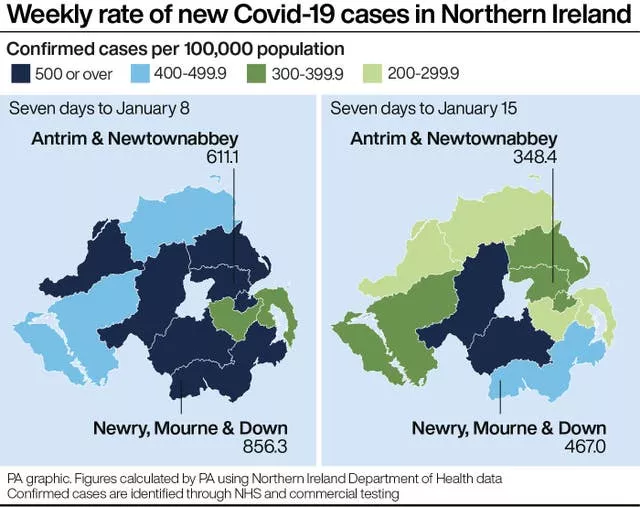By Michael McHugh, PA
Vaccination has begun to drive down the rate of coronavirus infection of the most vulnerable in Northern Ireland, the region's chief medical officer said.
Nursing homes and the over 80s population have seen pressures easing, Dr Michael McBride added.
Fresh supplies of the Oxford/AstraZeneca inoculation have arrived and will be sufficient for the octogenarian and older population, Stormont Health Minister Robin Swann said.
Dr McBride said: “Some pressures on care homes are easing.
“That may be an early sign that the vaccine is beginning to have an impact.”
Inoculations of those aged over 75 are due to begin shortly, Patricia Donnelly, who heads the vaccination programme, said.
Almost 35,000 of those aged over 80 have been dosed.
Dr McBride said: “It is not a race. Each system is different, some challenges each jurisdiction faces are different.
“We have a long way to go in terms of the vaccine programme.”
More than 154,000 doses have been administered in Northern Ireland.
Fewer than 1 per cent have been wasted.

Dr McBride said they wanted to vaccinate as many people as possible before easing social movement restrictions and warned any unwinding of curbs would be gradual.
He added: “It would be premature to believe that magically on February 6th when the current restrictions are due to come to an end it is back to business as usual.
“The virus will not be where we need it to be to allow us to resume life as normal.”
A further 24 deaths with coronavirus have been recorded in Northern Ireland.
According to Northern Ireland Department of Health figures, there have also been another 713 positive cases of Covid-19.
Some 842 Covid-positive patients are being treated in hospital, 70 of whom are in intensive care units.
The reproductive rate of virus spread has fallen below one, Dr McBride added.
Officials from the Department of Health outlined the pressure the health service is facing.
The number of hospital admissions has begun to peak, with intensive care cases expected to follow.
Dr McBride added: “We do need to see very significant reductions in the pressure on our health service.
“We are not likely to see that for some significant weeks.”
He said he was “increasingly concerned” about the new highly-transmissible UK variant and estimated it was responsible for up to a third of cases.
The contact tracing centre dealt with 2,300 cases a day over the festive period.
On occasion, contact tracers have stayed on the phone with people while medical help was organised.
Director of contact tracing Liz Mitchell said: “Most people are pleased to have been contacted, pleased to describe what their circumstances have been, get a bit of advice and sometimes if they are living alone then they are happy to chat and talk to people.
“It is very person-centred and compassionate group of people.”






